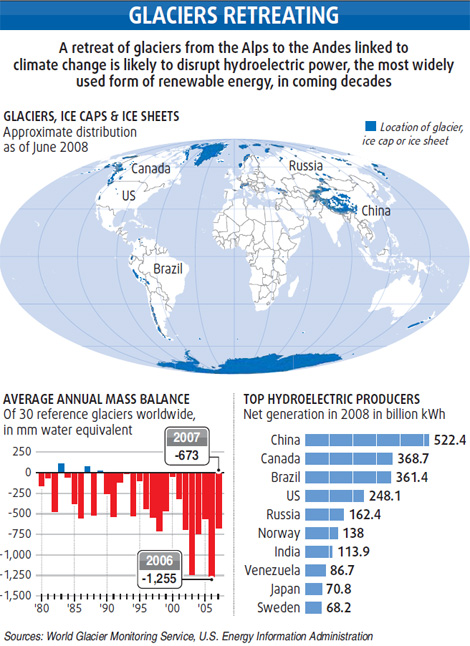
|
WORLD> Global General
 |
|
Meltwater won't be good news forever for hydropower
(China Daily)
Updated: 2009-10-27 09:32 RHONE GLACIER, Switzerland: Standing on the glacier at the source of the Rhone river, glaciologist Andreas Bauder poses next to a 3-meter high pole sticking out of the ice, and gestures above his head.
From the Himalayas to the Andes, faster-melting glaciers spell short-term opportunities - and long-term risks - for hydroelectric power and the engineering and construction industries it drives. The most widely used form of renewable energy globally, hydro meets more than half of Switzerland's energy needs. As summers dry and glaciers that help drive turbines with meltwater recede, that share may eventually fall. A study by Lausanne's EPFL Technical University forecast a decline to 46 percent by 2035 for hydro from around 60 percent now as precipitation declines and total energy use increases. In the same way as the Himalayas are "Asia's water-tower", Switzerland is the source of Europe's biggest rivers, supporting agriculture and waterways, and cooling nuclear power stations. Water trickled down white-blue crevasses and ice cracked and creaked as Bauder, who for Zurich technical university spends about 20 to 30 days a year working on Swiss glaciers, explained that most of the mighty Rhone glacier will be gone by the end of the century.
More than a billion people worldwide live in river basins fed by glacier or snow-melt. Glaciers have been retreating dramatically since the end of the Little Ice Age in the 19th century, particularly in the Himalayas where they feed rivers including the Mekong and Yangtze and ensure water and power for fast-growing economies. A lack of water for hydropower is already "critical" in Bolivia, Peru, Colombia and Ecuador, according to the UN's Intergovernmental Panel on Climate Change, which also sees risks to water supplies to southern California from the loss of the Sierra Nevada and Colorado River basin snowpack. In Europe, 20 percent of electricity comes from hydro - generating potential that is projected to decrease by the 2070s, falling sharpest in the Mediterranean. Bauder pointed to an area of stony ground and small lakes beyond the end of Rhone glacier ice field: "When I was a kid, I remember that the glacier was much larger. The glacier tongue was still reaching over this rocky area." 
|
||||||||